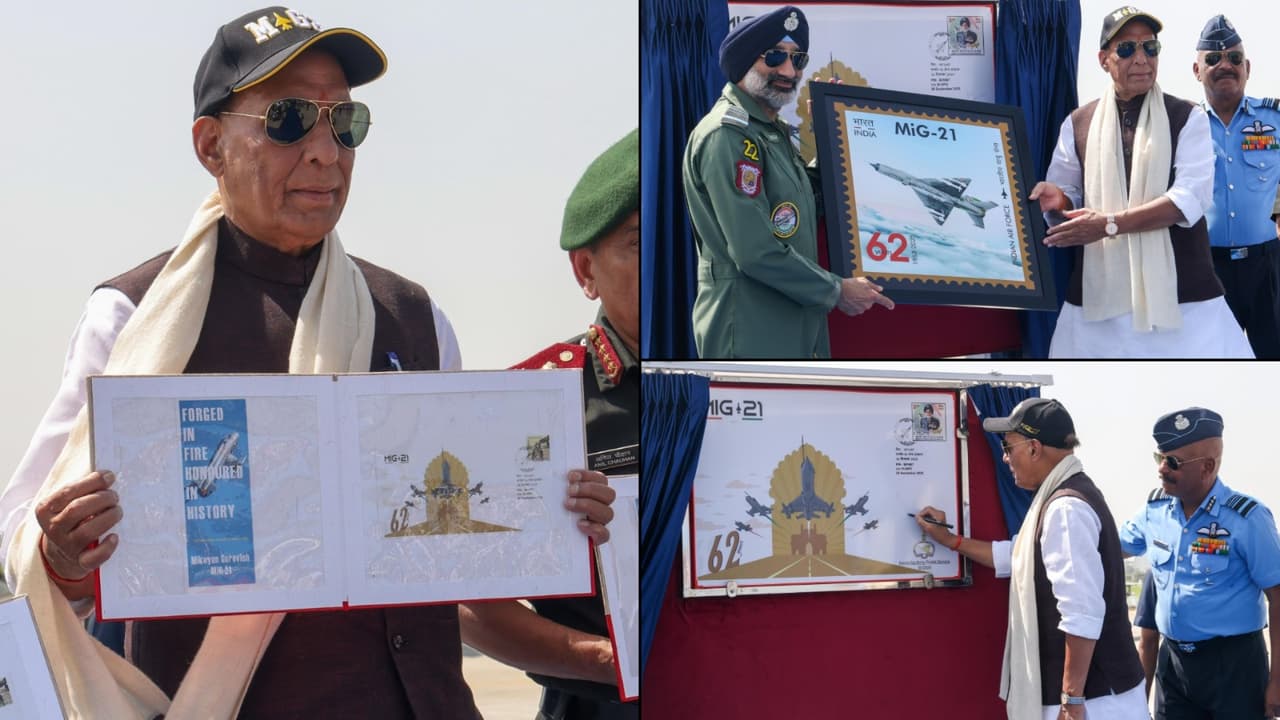Rajnath Singh hailed the MiG-21 as the ‘bird of all seasons’ during its decommissioning ceremony, crediting it with shaping generations of IAF pilots and India’s air strategy. Serving for 62 years, the jet fought in 1971, Kargil, Balakot, and beyond.
Chandigarh: Testifying the aircraft’s popularity, credibility and multi-dimensional capabilities, the defence minister, Rajnath Singh on Friday described the MiG-21 fighter aircraft as the ‘bird of all seasons’, stating that it has excelled in every conceivable role as an interceptor, a ground-attack platform, a frontline air defence jet, and a trainer aircraft that groomed countless pilots.
Rajnath Singh’s Emotional Farewell
“The foundation of our highly skilled fighter pilots was laid on the MiG-21. Standing on this legendary platform, generations of air warriors learned to fly, adapt, and succeed in the toughest conditions. Its role in shaping India’s air strategy cannot be overstated,” Rajnath Singh said during the decommissioning ceremony of MiG-21 that serves the country for 62 years.
Scroll to load tweet…
“The aircraft symbolises the continuity of courage, discipline and patriotism that will inspire the development of indigenous platforms such as LCA-Tejas and the upcoming Advanced Medium Combat Aircraft (AMCA),” he stated.
On Friday, the MiG-21 made the final operational sortie, bringing to a close an illustrious chapter of over six decades in the history of the IAF.
He also stated that more than 11,500 MiG-21s were built worldwide, of which approximately 850 served with the IAF.
From 1971 To Balakot: MiG-21 Bows Out After 62 Years
Recalling how the MiG-21 proved its mettle in multiple theatres of war and conflict, he said the fighters have played a crucial role from 1971 Indo Pak war, where it attacked the Governor’s House in Dhaka under hostile conditions and hastened India’s victory, to its presence in the Kargil conflict, the Balakot airstrike, and Operation Sindoor.
“In every historic mission, the MiG-21 carried the Tricolour with honour. Its contribution has never been limited to a single event or battle, it has been a pillar of India’s air power for decades,” he highlighted.
Rajnath Singh further stated that the MiG-21 performed far beyond expectations of both its designers and operators, evolving from a 1950s-era jet into a formidable, upgraded platform known by names such as Trishul, Vikram, Badal and Bison.
Speaking about the misconceptions regarding the age of the aircraft, Rajnath Singh clarified that while the initial MiG-21s inducted in the 1960s and 70s were retired long ago, the aircraft in service until now were at most 40 years old, a lifespan considered normal for fighter jets worldwide.
He underlined that the MiG-21 was continuously upgraded with advanced radars, avionics and weapon systems, thanks to the efforts of Hindustan Aeronautics Limited (HAL).
Commending HAL engineers and scientists, he stated that their relentless work kept the aircraft technologically relevant and battle-ready for decades. He further emphasised that this farewell should not be seen merely as a ceremonial military tradition, but as an extension of India’s civilisational ethos.
